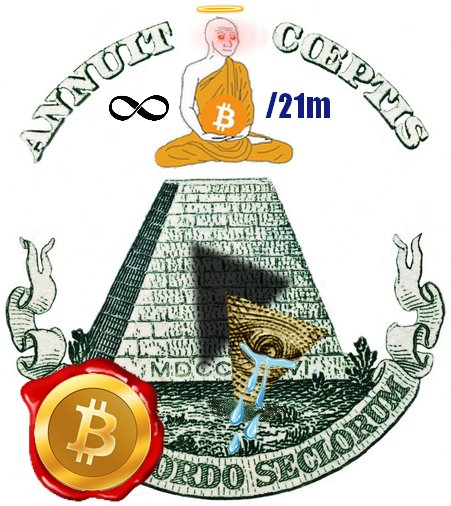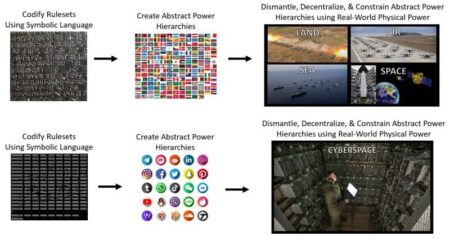I’m certainly no expert on computer science, military theory, or anything, so this is simply a layman’s attempt at making sense of the whole Bitcoin “softwar” debacle.

Let’s start with a brief summary (purely from memory) of the discussion
I already wrote this thread, and below is the most recent interview regarding the Bitcoin is/is not a “weapon/violence” debate:
Jason boils Bitcoin down to primarily a very secure cyber defense system, that just happens to double as a very good/secure monetary system.
The term “coin”, as in “bitcoin” is an abstraction, and a more accurate description would be reusable Proof-of-Work units (rPOW).
However, the security of the system will obviously rise in accordance with the monetary value of the rPOW units (i.e. “bitcoins”).
Miners secure the system via physical power (watts), and they are incentivized to do so because of the monetary reward.
Without the tremendous amount of energy the miners put into the block creation, the 51% attack ROI (return on investment) ratio would be that much higher.
Marty points out that there are other security measures in place as well, like nodes.
(Also, a successful 51% attack would immediately ruin the “loot”, as the price of Bitcoin would drop like a stone on the news (don’t remember if this was mentioned)).
(Obviously, it would be very hard for the attackers to cash out whatever they managed to get from the attack, since the blockchain is transparent).
Jason sees Bitcoin as a revolution within computer science, as nothing like this has existed before.
The whole global power grid becomes part of a global decentralized computer, converting watts to cyber rPOW units.
This, according to Jason, creates an internet “base layer” that is totally different from the rest of cyberspace, since nothing can be changed without expanding vast amounts of real-world physical power (watts).
Marty does not agree, as POW can only protect the integrity of the Bitcoin Network.
Also, POW alone is not enough, you need rPOW units with monetary value to incentivize the protection provided by miners.
Marty basically states that he is no fan of the government, and that he doesn’t want to give them an “attack vector” in the form of a “Bitcoin is a weapon” narrative.
End of summary – start of my own reflections
It’s very obvious to me that Jason is correct when he states that “Bitcoin is proof of proof of work working”.
Vast amounts of monetary value is stored in the network, and nobody has been able to hack it for 13+ years.
However, POW only works because of the monetary value, as Marty points out.
The crucial question is; can the Bitcoin Network serve as a cyberdome security network? Is the war/weapon description accurate?
Jason claims that Bitcoin, via POW, can secure all sorts of software “control action” in cyberspace.
Jack Mallers is already proving that Bitcoin can, indeed, be used to fend off spam:
Awesome new product built on the @Strike API: https://t.co/7aQa1tzLxQ
Solving the email spam problem with #Bitcoin and Lightning payments.
The public can now reach me at jack@reacher.me for $1
The future of the Web is using #Bitcoin as the internet's native currency.
— Jack Mallers (@jackmallers) May 2, 2022
You cannot send someone an email without paying their chosen #sats fee, and voila(!), spam becomes very expensive.
Not only that, the spam fee goes directly to the owner of the email, so you monetize your own accessibility.
It’s not hard to see the same concept being implemented on password security.
Each brute force attempt costs X amounts of #sats paid to the owner of whatever account the hacker wants to attack.
You can even choose a specific amount of #sats (like 34,587, or whatever) to go with the password attempt.
Imagine trying to brute force that.
You would have to pay all sorts of amount of sats per attempt, but you don’t reach the actual password level without the exact amount of sats to go with it.
I asked Marty why he dismissed Jason’s cyberdome idea so easily:
Because it's not the actual bitcoin network protecting those systems, it's economic incentives. Bitcoin can only protect its own ledger. That's literally how the consensus code works. Everything else is tangential.
— Marty Bent (@MartyBent) November 30, 2022
His valid point is that watts are not really protecting anything but the integrity of the Bitcoin network.
It’s the monetary value of #sats (protected by watts) that protects the Reacher Me emails from spam, not physical energy (watts) directly.
Could any state-created CBDC token be able to do the same?
As far as I can see, this seems to be the case.
At least as long as the CBDC token has sufficent monetary value measured against the dominating currencies, and other nations (or bad actors) are not able to print it.
The government could this use their own CBDC token as a cyberdome defense system, instead of Bitcoin.
I plan to ask Jason about this the next time he tweets, and I will update this article to include the response here (if I get any).
This has major implications for his thesis about nation states engaging in Mutually Assured Preservation Bitcoin “hashing wars”.
If they can simply use their own CBDC for the same purpose, Bitcoin is not needed.
However, Bitcoin is by far the best alternative for individuals and companies who want this kind of cyberdome protection.
Sure, a company/person can launch its own cRyPtO token, but it will be hard to make it sufficiently valuable and secure for such a use case.
Nation states who use their own CBDC as a cyberdome defense system also risk a lot more attacks against their currency in different forms.
This is an argument for why many nations probably would want to go with Bitcoin for this use case instead.
Is the “softwar” scenario good or bad for regular bitcoiners?
There seems to be a lot of fear/skepticism about government involvement in the “anti-Jason” part of the Bitcoin community.
This is understandable, given the widespread anti-statism (I’m certainly no fan of central control myself).
However, we have to deal with reality as it is, not like we wish it would be.
If the above holds any merit, it’s not like the government is not gonna figure it out.
The question then becomes; how does this affect regular bitcoiners?
Let’s say the “hashing war” erupts, as many nations join in…
Well, then you’ll have one hell of a secure network, and the Bitcoin fiat price will skyrocket beyond belief…
Will the government attempt to “take over” mining facilities to secure rPOW tokens?
As Jason has pointed out, it’s easier for them to simply outsource it to the private military industrial complex.
Even if some, or all, nations did “take over” larger mining facilities, it wouldn’t affect regular bitcoiners.
Only the miners who lost the business…
Is Bitcoin a weapon?

The idea that the governments will see, or try to paint, Bitcoin as some kind of WMD that can somehow hurt anyone is ludicrous.
Bitcoin has never harmed a single person, and it’s hard to see how it can (except via some kind of working accident).
The weapon/war thing is an analogy, and people got hung up on semantics (picturing the horror of hardwar) instead of seeing the bigger picture.
If Jason’s thesis leads to international Bitcoin hashing wars, it means you’re set for life if you own 0.5 BTC, and probably less…
The FOMO would be unbelievable to behold, and suck everyone – all 8 billion of us – in like a black hole.
The Jason-skeptics seem to think it’s about a “war” between individuals and the state.
They are not incorrect, at least not as long as we find ourselves in the Mutually Assured Destruction paradigm.
This war cannot be fought with Bitcoin and speech alone, however, as the 1st amendment is backed by the 2nd.
Just like Bitcoin is secured by decentralized physical energy (watts), so our so-called free speech is backed by decentralized physical violence (gun ownership).
The cost/benefit and success probability ratio of hard tyranny is too low when a sufficient amount of the individual “nodes” own guns .
These nodes secure the whole network of humanity (if the US collapses into full tyranny, the rest of the west/world falls quickly).
Physical power projection (potential for violence) and guns are therefore not “all bad”, as many seem to assume.
Without the millions of US gun owners, the country would be more or less like China at this time.
It’s far from an ideal situation, but saying “bitcoin is peace/speech/code” does not change reality.
Given the above, it’s clear to me that Bitcoin has a massive potential for world wide adoption.
It can happen a lot quicker than most people think, given the hashing wars scenario.
All in all, this is a good thing for both Bitcoin and regular bitcoiners.
It’s just that hyperbitcoinization might not come exactly in the form most of us would have preferred…
With that being said, let’s give AI the last word in this debate:
Just did it for you…. pic.twitter.com/B4vnVV7J42
— Snapolina (@snapolino) December 2, 2022

Check all my editorials here: https://bitcoinmaxinews.com/editorials/

